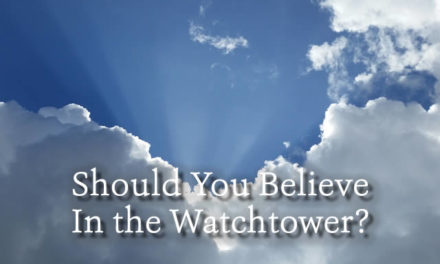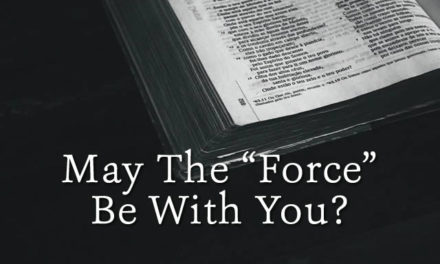Has the Watchtower Society purposefully misquoted people in defense of their views?
“Accuracy of Statement. Jehovah’s Witnesses are an organization of truth. We should want to speak the truth and be absolutely accurate in every detail at all times. This should be so not only as regards doctrine, but also in our quotations, what we say about others or how we represent them, also in matters involving scientific data or news events” (Theocratic Ministry School Guidebook, page 110).
Does the Watchtower speak with a forked tongue?
It should go without saying that if one’s “truth” must be defended with a lie then that so-called “truth” is also a lie. Christians should not fear having their faith challenged or examined closely.
It would not necessarily be an indictment on any given religion if one of its adherents lies in defense of his faith. That could just be his own weakness manifested. However, if the religion’s leaders lie regularly and sanction it on the part of their followers then that shows the poverty of truth at its foundation. It would be an indictment on the religion just as the Watchtower said in their School Guidebook.
Has the Watchtower Society purposefully misquoted people in defense of their views? The answer is definitely Yes. Most of the dishonesty can be found in their representations of our scholars comments on scripture translation, especially John 1:1, and historical events as they relate to doctrinal development, especially the Trinity.
“The Word was God” or “a god?”
When the Watchtower Society published their New World Translation they rendered clause C of John 1:1 as “the Word was a god.” This drew the attention of Christian scholars and their unanimous rejection. In order to defend their rendering the Society represented certain scholars as supporting the rendering, if not directly, then indirectly.
When this writer asked the Society about their John 1:1 rendering they replied with this comment.
“Note what Mr. Harner writes as to John 1:1: ‘In John 1:1 I think that the noun cannot be regarded as definite.’ Therefore, the Greek at John 1:1 is not overwhelmingly ‘definite’ as Colwell and others maintained so that the text should be rendered in the definite ‘the God.’ Rather, as Harner shows there is the qualitative force possible, hence, warranting ‘a god,’ meaning quality of Godlikeness or a mighty one” (Watchtower letter to David Henke, October 24, 1975).
The noun the Society is speaking of in John 1:1 is the word God in clause C. The issue, briefly stated, is that if the word God is definite, i.e., “the God”, then Jesus would be all there is to God. If the word God is indefinite then Jesus would be a lesser god, or “a god,” as the Society contends. However, the whole point of Harner’s article in the Journal of Biblical Literature (JBL) was that there was a middle ground that did not say too much, nor too little.
Further in the JBL article Harner gave five examples of what John could have said as alternatives to what he actually said. This was Harner’s way of demonstrating that the “qualitative force” of Theos was so strong as to require that it be understood as equating Jesus’ divinity with that of God the Father.
One of the alternatives would have been rendered as “a god,” a lesser deity than the Father. This was alternative D in Harner’s list of possibilities. Harner specifically rejected this alternative. He said, “John evidently wished to say something about the logos that was other than A (the God) and more than D (a god)….
But in all these cases the English reader might not understand exactly what John was trying to express. Perhaps the clause could be translated, ‘the Word had the same nature as God.’ This would be one way of representing John’s thought, which is, as I understand it, that ho logos (the Word), no less than ho theos (the God) had the nature of theos (God)” (parenthesis mine).
The Watchtower Quotes The Patriarchs
The correct rendering of John 1:1 is of absolutely central importance. The Society knows this because if Jesus is “God” in the same sense that the Father is God then the Society would have to admit that it is following a false god of its own creation. Therefore, they must first keep Jehovah’s Witnesses in the dark about what the scholars, even non-Christian scholars, have said about it, then second, represent some scholars in such a way as to seemingly endorse their renderings.
In their booklet The Trinity: Should You Believe It? The Watchtower misquotes, or misrepresents the views of many of the early Church Fathers. In the vast majority of their quotes the Watchtower fails to use footnotes. This leaves the reader without a practical means of verifying the statement. Was this on purpose?
One undocumented misrepresentation is that of Clement of Alexandria. The Watchtower said, “Clement of Alexandria, who died about 215 C.E., called Jesus in his prehuman existence “a creature” but called God “the uncreated and imperishable and only true God.” He said that the Son ‘is next to the only omnipotent Father’ but not equal to him” (page 7).
Why would Clement say Jesus was a creature and unequal to God on one hand and then call Jesus, “The Divine Word, He that is truly most manifest Deity, He that is made equal to the Lord of the universe.” And again, “The divine Instructor is trustworthy,… for He is God and Creator. ‘For all things were made by Him, and without Him was not anything made’” (The Ante-Nicene Fathers, Volume 2, pages 202, 234).
The above named Watchtower booklet cites Origen, Hippolytus, Tertullian, Justin Martyr, and Irenaeus, as teaching contrary to the historic Trinitarian orthodoxy. Nothing could be farther from the truth. All of their representations of these early Christian thinkers are misrepresentations. They are simply not true.
Who Is The Faithful And Wise Servant?
Today the Watchtower teaches that Matthew 24:45-47 is about a class of people, the whole leadership of the Society, and not just one man. They say it is the basis of their authority to teach, lead, and control the lives of Jehovah’s Witnesses. However, in the past it was not always so.
Charles Taze Russell founded the Watchtower Society. Early in his leadership he was relatively humble about his place in the organization. Like most cult leaders he took the adulation of his followers to heart and became convinced of his special anointing by God to be the “faithful and wise servant” dispensing meat in due season to the household of faith.
After Russell died Judge Rutherford’s status as the new leader was diminished by the continuing view of Russell as “that servant.” He therefore began to move the organizations teaching away from Russell and toward the Society as “that servant.” Over time those who disagreed either left or died. Today every Jehovah’s Witness believes the Faithful and Wise Servant is the organization represented by its leadership.
However, the topic of Russell’s claim has come up and the Society denied he ever made the claim.
They said, “From this it is clearly seen that the editor and publisher of Zion’s Watchtower disavowed any claim to being individually, in his person, that ‘faithful and wise servant.’ He never did claim to be such” (God’s Kingdom of a Thousand Years Has Approached, 1973, page 346).
They went further and said the attribution of the Servant title to Russell was due to the adulation of his devoted followers (page 346-347). The Society attributes this view of Russell to the book The Finished Mystery, published by The People’s Pulpit Association. What they don’t say, and most Witnesses at the time would not have known, is that the People’s Pulpit Association is just another name for the Watchtower Society. So the Society really was promulgating this view.
Finally, the editor of the Watchtower magazine, Russell himself, allowed this statement to be published in the December 1, 1916 Zion’s Watchtower magazine. “Thousands of the readers of Pastor Russell’s writings believe that he filled the office of ‘that faithful and wise servant,’ and that his great work was giving to the household of faith meat in due season. His modesty and humility precluded him from openly claiming this title, but he admitted as much in private conversation” (Reprints page 5998).
Conclusion
The Watchtower Society actually said it best. “Inaccuracies that are recognized by an audience raise questions as to the authority of the speaker on other points, perhaps even calling into question the truth of the message itself” (Theocratic Ministry School Guidebook, page 110).
By David Henke






